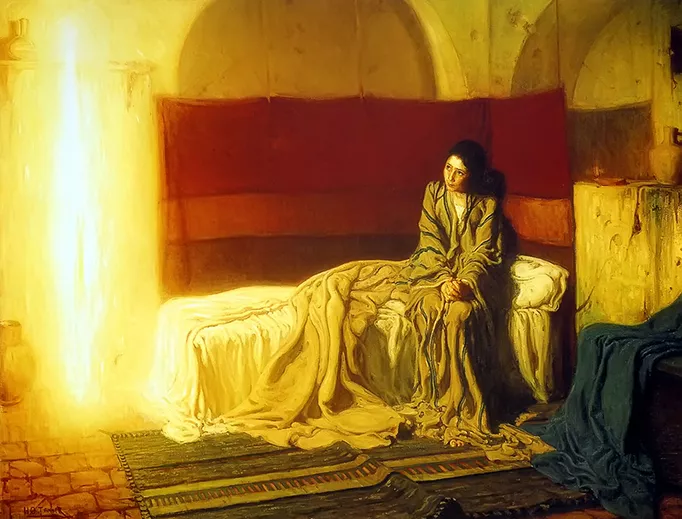23 November 2023
Beginning Advent With Gabriel, Zechariah, & Mary
By Joey Belleza
The Gospel of Luke is notable for, among other things, its rather attentive narratives concerning the Blessed Virgin Mary during the infancy and youth of our Lord. The stories of the Annunciation, the Visitation to Elizabeth, the finding of Christ in the Temple, and the Nativity itself all manifest such detail that, as many scholars (including Pope Benedict XVI) have theorized, these accounts were likely given directly from the Blessed Mother to Saint Luke. The phrase “Mary pondered all these things and kept them in her heart,” repeated twice in Chapter 2 of Luke’s Gospel, suggests not only Luke’s voice interpolated into Mary’s recounting of her memories; it more importantly points to the same silent, faithful humility of the Lord’s handmaiden who believed the words of the archangel Gabriel.

Luke presents two parallel stories– two annunciations, in fact– in Chapter 1: the first is the annunciation of the coming of John the Baptist to Zechariah in the Temple, and the second is the Annunciation properly speaking, that is, the message of the angel to Mary. In both stories, Gabriel surprises the two respective interlocutors with surprising news: to Zechariah he announces the pregnancy of his elderly wife Elizabeth; to Mary he announces her role in the coming of the Messiah. In each case, the truth of the message is so strange that both must ask, “how can this be?” Elizabeth is elderly and Mary is a virgin; how can either be pregnant? This leads to another problem. Zechariah is struck dumb for his unbelief, but Mary’s question is met with a further explanation from the angel. Why is Gabriel more patient with Mary than with Zechariah?
One reason, we might suggest, turns on the fact that Zechariah is a priest, but Mary is a young girl. The former has given his life to the service of God in the Temple, a service which required profound study of the Law and Prophets. Certainly the appearance of the angel within the temple would be a terrifying sight, enough to fluster any man, but in comparison to a young girl from Nazareth, we can still say that Zechariah simply should have known better. Already faced with the extraordinary apparition of a divine messenger, he nevertheless protests the content of the message by appealing to its improbability. Note that Zechariah says, “my wife is advanced in years,” not “my wife has passed her childbearing years.” His own words are not an indication of impossibility, and the story of Abraham and Sarah, who conceived in old age, should have been proof enough for this educated priest that the angel’s message could and would be fulfilled. Mary, on the other hand, is faced with a situation of true natural impossibility. A virgin cannot conceive except by some divine power exceeding the power of natural generation, a power now explained to her by the angel. Her question is therefore one of mere natural reason, not true doubt. And when the divine reason is pronounced to her, she conforms her will to God’s and consents to participate in the Incarnation of Christ.
Notice also that the angel says that John would be filled with the Holy Spirit even before Zechariah’s objection, while the power of the Holy Spirit is explained to Mary only after her naturally reasonable question. It is perhaps this momentary doubt of the power of the Spirit–who is, in fact, truly God–that condemns Zechariah to temporary muteness. In this light, we might be able to understand Christ’s own words in the Gospels of Mark and Matthew, where he mentions that “blasphemy against the Holy Spirit” is the only unforgiveable sin. Zechariah certainly does not blaspheme, but his questioning of the Spirit who, as the Creed says, is “Lord and giver of life”, certainly did the priest no credit. Mary, on the other hand, is really given little information–far less than the poetic prophecy initially given to Zechariah in the Temple. But her trust in God and conformity to his will supplies for the limits of her human understanding.
As the season of Advent begins, the parallels and contrasts between the “two annunciations” might teach us something about trusting in God. With the benefit of 2000 years since the Incarnation, we are in many ways like Zechariah. We should know better. We already know that Christ came to us as a child, died as a man, rose from the dead, ascended into heaven, and now continues his work on earth through the Church and her Sacraments. But despite this enduring presence, we still have moments when we let our doubt and our merely natural ways of thinking overcome our confidence in the power of the Holy Spirit. And when we allow ourselves to fall into this doubt, we too fall “dumb” like Zechariah, closed off from the divine wisdom, struggling in vain to bring God down to our ways of thinking. Christ rebuked Peter for this very sin– “thinking as men think, not as God thinks”– when he prophesised his Passion and death. But the Blessed Virgin Mary excels all human creatures, for when she is pushed to the limits of her own understanding, she utters not a word of protest but a word of faith in the God who had already brought forth life in the wombs of Sarah and Elizabeth. And with her word of faith, the Word was made flesh and dwelt among us. Let us look forward to the coming of Christ the Lord, Son of God and Son of Mary, with her same expectant faith.
